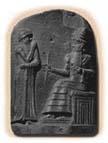Hammurabi: King and Code
Hammurabi was an Amorite king who ruled over the joint civilization forged from the Sumerian and Akkadian, traditions in Mesopotamia. This all took place about 4,000 years ago. Hammurabi was first and foremost a warrior king. His conquests were the results of victories in battle. He was also a strong-handed ruler. Evidence such as streets laid out in straight lines and at right angles and his famous Code of Laws point to Hammurabi's being a strong ruler of a strong government, which ruled over its people with a tight grip. He also made his capital of Babylon and his empire in general the envy of other civilizations. Large, tall temples were built, along with huge public buildings, canals were dug for irrigation, all surrounded by stout stone walls.
In truth, Hammurabi did not invent much of this Code. Rather, he put it together from his own set of laws and from the laws of the people he conquered. Thus, certain statutes as have been seen in Sumeria are to be seen here as well: strict punishment for judges and witnesses who abuse the legal system, for instance. In 282 strains, statutes for virtually all parts of society are laid out, sometimes in great detail. The importance of Hammurabi and his Code of Laws is that he was not the first monarch to make such laws but that he was the first to record them for his people and prosperity. This is a worthy legacy indeed. The latter years of Hammurabi's reign were spent in almost constant warfare. One look at a map of the area will tell you that Mesopotamia had few natural boundaries. Plunderers from all directions found it easy to roll right into the area and challenge the established ruler(s) for supremacy. But for all Hammurabi's successes and failures in battle, his greatest success lies in legal codification. |
|
Social Studies for Kids
copyright 2002–2026
David White



 And
what about that Code? Well, that's what he's really famous
for. We have inscriptions that tell us most of what was in
the Code, and it's famous not so much for what it says but
for what it does: It makes it plain for all what the laws
are. People could no longer claim that they were ignorant of
the laws. Arbitrariness in punishment disappeared as
well.
And
what about that Code? Well, that's what he's really famous
for. We have inscriptions that tell us most of what was in
the Code, and it's famous not so much for what it says but
for what it does: It makes it plain for all what the laws
are. People could no longer claim that they were ignorant of
the laws. Arbitrariness in punishment disappeared as
well.

